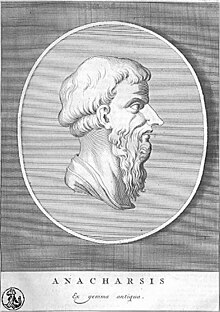Anacharsis
Scythian philosopher
Anacharsis was a Scythian traveller and philosopher of the sixth century BC who visited Athens. His observations on Ancient Greek culture survive only through the testimony of writers who lived many centuries after his time.

Quotes
edit- These decrees of yours are no different from spiders' webs. They'll restrain anyone weak and insignificant who gets caught in them, but they'll be torn to shreds by people with power and wealth.
- Discussing Solon's laws with him, as quoted by Plutarch, in Solon ch. 5; translation by Robin Waterfield from Plutarch Greek Lives (1998) p. 50.
- Variants:
- Written laws are like spiders’ webs; they will catch, it is true, the weak and poor, but would be torn in pieces by the rich and powerful.
- Laws are spider-webs, which catch the little flies, but cannot hold the big ones.
- as quoted in Beeton's Book of Jokes and Jests, or Good Things Said and Sung, Second Edition, Printed by Frederick Warne & Co., London, 1866.
- The forum [is] an established place for men to cheat one another, and behave covetously.
- As quoted in The Lives and Opinions of Eminent Philosophers by Diogenes Laërtius, as translated by C. D. Yonge (1853), "Anacharsis" sect. 5, p. 48
- Under which head do you class those who are at sea?
- Having been asked whether the dead or the living were more numerous., as quoted in The Lives and Opinions of Eminent Philosophers by Diogenes Laërtius, as translated by C. D. Yonge, (1853), "Anacharsis" sect. 5, p. 48
- My country is a disgrace to me, but you are a disgrace to your country.
- On being insulted by an Athenian for being a Scythian, as quoted in The Lives and Opinions of Eminent Philosophers by Diogenes Laërtius, as translated by C. D. Yonge, (1853), "Anacharsis" sect. 5, p. 48
- Better to have one friend of great value, than many friends who were good for nothing.
- As quoted in The Lives and Opinions of Eminent Philosophers by Diogenes Laërtius, as translated by C. D. Yonge, (1853), "Anacharsis" sect. 5, p. 48
- A vine bears three grapes, the first of pleasure, the second of drunkenness, and the third of repentance.
- As quoted in Diogenes Laertius, The Lives and Opinions of Eminent Philosophers, Chapter "Life of Anacharsis", 1702 edition, John Nicholson, p. 55.[1]
- A view of the unseemly actions of drunken men is the most effectual dissuasive from wine.
- As quoted in Diogenes Laertius, The Lives and Opinions of Eminent Philosophers, Chapter "Life of Anacharsis", 1702 edition, John Nicholson, p. 55
Quotes about Anacharsis
edit- He also said that he marvelled that among the Greeks, those who were skilful in a thing contend together; but those who have no such skill act as judges of the contest.
- Diogenes Laërtius, in The Lives and Opinions of Eminent Philosophers, as translated by C. D. Yonge (1853), "Anacharsis" sect. 5, p. 47
- Variant translation: He marvelled that among the Greeks, those who were skillful in a thing vie in competition; those who have no skill, judge.
References
edit- ↑ Diogenes Laërtius (1702). "Life of Anarchasis". The Lives of the Ancient Philosophers: Containing an Account of Their Several Fects, Doctrines, Actions and Remarkable Sayings.... John Nicholson. p. 54. Retrieved on 4 September 2013.